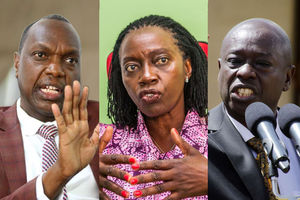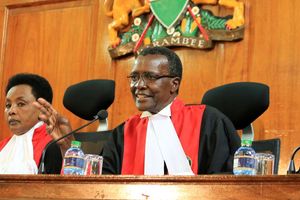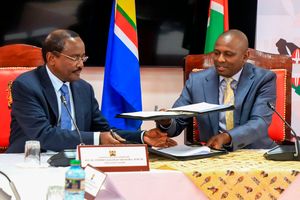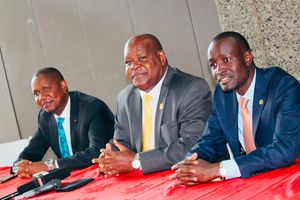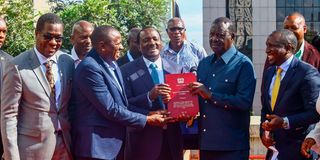
Azimio leader Raila Odinga holds a copy of a copy of Nadco report flanked by Wiper Party Leader Kalonzo Musyoka, Majority leader Kimani Ichung’wah and other leaders at Capital Hill.
Azimio Coalition has raised the red flag following delays in working on Bills linked to the Bomas talks report weeks after it was adopted by parliament and left in the hands of a team of legislators.
Despite the commitment by President William Ruto and opposition leader Raila Odinga, the much hyped plans to prioritise National Dialogue Committee (Nadco) report by MPs before parliament resumed after long recess has quickly gone silent.
The joint Justice and Legal Affairs committees of the National Assembly and Senate was given 45 days to consider nine Bills that emanated from the report, but a meeting planned for this week failed to take off.
The committee co-chaired by George Murugara (Tharaka) and senator Wakili Hillary Sigei (Bomet) was tasked to provide a framework for the actualisation of the Bills, but surprisingly two crucial meetings have aborted after the inaugural one.
Wednesday last week, the second meeting flopped after MPs said the first one aborted because senate gave priority to the impeachment motion against Kisii Deputy Governor Robert Monda .
However, it is now emerging that the developments are not a coincidence and could be a ploy to derail the implementation process, which has ignited a debate on whether they should pursue the referendum route or parliamentary initiative.
The Nation has, however, reliably learnt of plans to slow down the implementation of the report by Kenya Kwanza
According to sources in parliament, the leadership drawn from both the National Assembly and Senate have had two meetings at committee room 9 followed by another at a high-end hotel where it was resolved to form an oversight committee that will oversee implementation of the report.
The oversight committee was to have an equal number of members from both sides to oversee the joint legal committee currently considering the report.
The meetings happened three weeks ago, but so far the oversight committee has not been formed.

President William Ruto and Deputy President Rigathi Gachagua receive the report of the National Dialogue Committee from Kalonzo Musyoka and Kimani Ichung'wah at State House, Nairobi on March 8, 2024.
Although President Ruto and Mr Odinga are the architects of the Bills, but are not in parliament, the oversight committee was to own them, and push for enactment by both houses.
“I can call it a failure of leadership from the Azimio side. They are not pushing enough for the consideration of the report. Both President Ruto and Mr Odinga had done their part. It’s upon them to now push for the implementation since the two are not in parliament,” said a senior opposition MP, who spoke in confidence.
The Nation has also learnt that the National Assembly leadership was also irked by the move by Minority leader Opiyo Wandayi to address the press on the appointment of the three nominees for the election audit team.
According to our sources, this was interpreted as giving instructions and directives to the speaker in public instead of exploring available channels in parliament.
“Since the speaker is in this process because he will be the one to offer even that audit team a secretariat and resources, he was not happy with the action taken by Azimio leadership. You cannot address the speaker in a press conference,” the source said.
While Azimio nominated their members led by former Attorney General Senator Amos Wako and ex nominated senator Judith Pareno, the Ruto side is reported to have quietly submitted the names of their nominees, who are yet to be made public despite speculation on who was in the team.
Sources within Azimio believe that part of the plan is to delay the process and only implement it piecemeal by giving the Bill on the reconstitution of the Independent Electoral Commission (IEBC) a priority and the rest take a back seat.
The IEBC (Amendment) Bill has been prioritised because of the pending by-elections that have denied services to constituencies and wards currently with no representatives.
Majority Leader Kimani Ichung’wah and Mr Wandayi have sponsored nine Bills: The Constitution of Kenya (Amendment) Bill, 2023, IEBC (Amendment) Bill, 2023, the Statutory Instruments Bill, 2023, Elections (Amendment) Bill, 2023, NGCA (Amendment) Bill, 2023. Leader of Opposition Bill, 2023, Elections Offences (Amendment) Bill, 2023 and Political Parties (Amendment) Bill, 2023 which all seek to implement the Nadco report.
The government side is also reportedly reluctant in prioritising the consideration of Bills from the report as they want key government agenda such as the conclusion of debate on the Bill on the appointment of Chief Administrative Secretaries (CASs) and the proposals for the 2024/2025 to sail through first.
While breaking for their short recess on Thursday, Mr Ichung’wa said the proposals will be in the House by April when MPs resume sittings.

Wiper leader Kalonzo Musyoka and National Assembly Majority Leader Kimani Ichung’wah address journalists at the Bomas of Kenya, Nairobi, on September 1.
The government wants to take advantage of the current calm political environment to pass key government Bills with ease before embarking on the report.
One of the legislators from the opposition side, who did not want to be named, said they have agreed to form a team, with numbers drawn from both sides to oversee the implementation of the report.
He, however, said the joint committee has no powers to prioritise some Bills over the other as they are only supposed to provide technical guidance on the implementation of the report.
“The committee can’t cherry-pick which Bills to deal with or not. They have no such mandate, their work is more technical in guiding the process,” the opposition MP said.
Mr Opiyo declined to speak on the matter, saying he is not a member of the joint committee and that the Nadco report gave clear recommendations.
Mr Ichung’wah, his senate counterpart Aaron Cheruiyot, chairman legal affairs committee and Senator Sigel did not answer our calls and messages.
Mr Murugara yesterday said there is still time to consider the Bills as the 45 days they were given do not include days when they are on recess.
“We have scheduled another meeting because we are on recess and in the constituencies. We will schedule another meeting as soon as parliament resumes,” Mr Murugara said.
He added: “Remember the 45 days we were given are not calendar days but sitting days of parliament hence they don’t include the days we are on recess.”.
The National Assembly is currently on its first short recess and will resume sittings on April 9
Mr Murugara also dismissed assertions that the committee will prioritise some Bills, saying they are yet to agree on the roadmap.
“We have not agreed on the roadmap, so for now we can’t say which Bills will be given priority. We have only had one meeting where we were setting the framework,” Mr Murugara said.
Vihiga Senator Godfrey Osotsi reads mischief in the delays in implementation of Nadco report despite the sacrifices that have been made by Azimio in order to get the product.
“The process has consumed taxpayers’ money and we shall not allow the saboteurs to derail its implementation. Those people are not bigger than Kenyans who went to the streets,” Mr Osotsi told the Nation.
He said Azimio has demonstrated good faith by nominating experts to audit 2022 elections while Kenya Kwanza is yet to name its team.
Today marks, 18 days since the report was committed to the joint committee by the National Assembly and Senate speakers and given 45 days to prepare implementation roadmap report.
While giving the 45 days’ timeline to the committee, National Assembly Speaker Moses Wetang’ula told the lawmakers to ensure strict adherence to the due process in considering the proposed amendments during the joint sittings.
“The two Committees are therefore directed to ensure strict adherence to the due process in considering the proposed amendments during the joint sittings. Finally, this matter being one of immense importance and public interest, the committees are directed to undertake the assignment expeditiously and to submit a report within forty-five (45) days from today).”
The Wednesday meeting was attended by only five MPs who did not form a quorum as stipulated in both the Standing Order of the National Assembly and the Senate. The committee requires eight members in order to conduct its business-three senators and five members of the National Assembly.
Those who attended the Wednesday meeting are Tharaka MP George Murugara, TJ Kajwang’ (Ruaraka), Otiende Amollo (Rarieda) and Senators Fatuma Dullo (Isiolo) and Veronica Maina.
However, one by one, they started leaving room 26 at Bunge Towers where the meeting was to be held with Mr Murugara only telling the committee secretariat that they will have to reschedule the meeting.
The Nadco report, which was a product of bipartisan consensus between Mr Ruto and Mr Odinga following a sustained anti-government protests made a myriad of proposals touching on legal and policy reforms and issues of concern to the people of Kenya.
Pending before the committee as part of its preliminaries to set the ball rolling is a decision on the contentious question of referendum and framework of conducting public participation on the nine Bills that emanated from the report.
In its first meeting, the committee said it was to give its position on whether the country would go for a referendum to implement some of the recommendations made in the report.
The committee was also set to divide the constitutional amendment Bills for ease of consideration. The committee was also to determine the extent to which the committee should go on public participation while considering the nine Bills borne out of the Nadco report.
Further, the joint committee was to decide on whether the committee will take public views on the Bill across the country or through memorandums.

